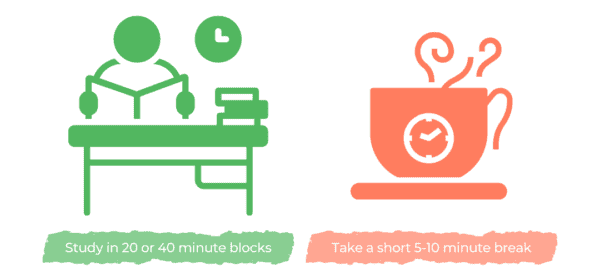Are you the type of student that procrastinates for a good hour or two and then crams in 4 hours of study right before you sleep at 12am? Do you find this to be effective study?
Let me guess, you wake up feeling tired, and somehow you still don’t really understand that thing you were studying last night…
If this is you, do not fear, because today we’re going to solve this problem and explain why you shouldn’t study for hours on end!
Run Up Hills
Study in Small Bursts
Studying is a Sprint, Not a Marathon
Run Up Hills
When you go for a run, sure you could do a cross-country style marathon which is pretty much level ground. Or, you could do a short sprint up a hill! Painful, but short — like ripping off a bandaid.
This is exactly how you should approach your studies! Don’t literally run up hills, but force yourself to work hard — for effective study your brain should be sweating.
Study in Small Bursts
Some students find studying in 20 or 40 minute blocks is most effective, and then taking a short 5 to 10 minute break.
Studying in small bursts can also help with our short attention spans. If you find that 20 minutes is not long enough to get into the groove, maybe you’ll find one hour blocks better!
Figure out what works for you, but the main thing is that your studying is broken up into smaller chunks. Plus, by tackling it one burst at a time, you won’t feel the exhaustion and defeat you normally would at 12am after 4 hours of slow work.
Studying is a sprint, not a marathon!
The main thing you want to do is change your outlook — studying should be small sprints, not a marathon!
You’ll find that these short bursts of energy, focus and productivity are really useful for memory retention and balancing study with breaks.
This is also your chance to fix up that sleeping pattern — no more 12am nights! There’s a period between approximately 8pm and 12am where your body repairs itself.
So by having smaller bursts of study and getting your work done earlier, you can get in bed before 12am to give your body the rest it needs after all that mental sweating.
Don’t run a marathon every night and set yourself up for a tired morning. Take the sprint approach and make your brain sweat!
Looking for some extra help with your studies?
We pride ourselves on our inspirational coaches and mentors!
We offer tutoring and mentoring for Years K-12 in a variety of subjects, with personalised lessons conducted one-on-one in your home or at our state of the art campus in Hornsby!
To find out more and get started with an inspirational tutor and mentor get in touch today!
Give us a ring on 1300 267 888, email us at [email protected] or check us out on Facebook!
Nandini Dhir is a Content Writer at Art of Smart and is currently studying a Bachelor of Arts (majoring in Marketing) and a Bachelor of Advanced Studies (Media and Communications), as a Dalyell Scholar, at Sydney University. She enjoys covering local issues in her area and writing about current events in the media. Nandini has had one of her pieces published in an article with the Sydney Morning Herald. In her free time, Nandini loves doing calligraphy, ballet, and sewing, or is otherwise found coddling her cats.




